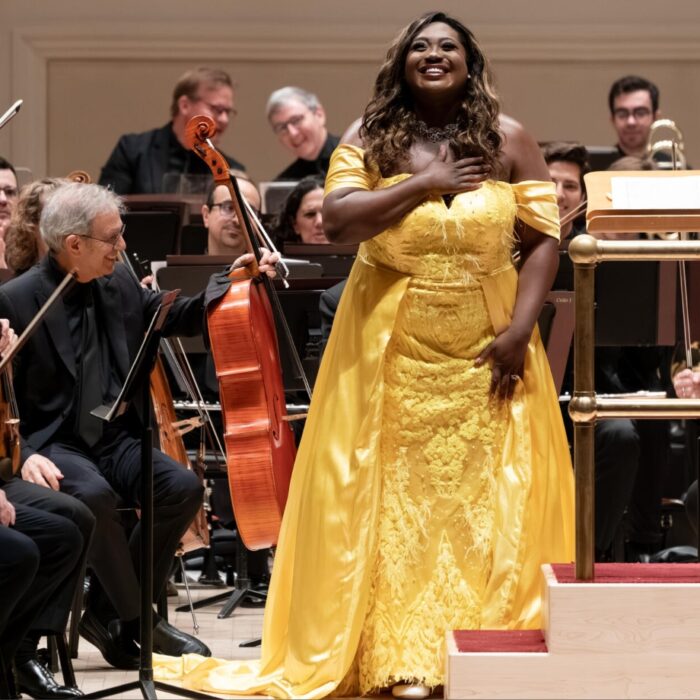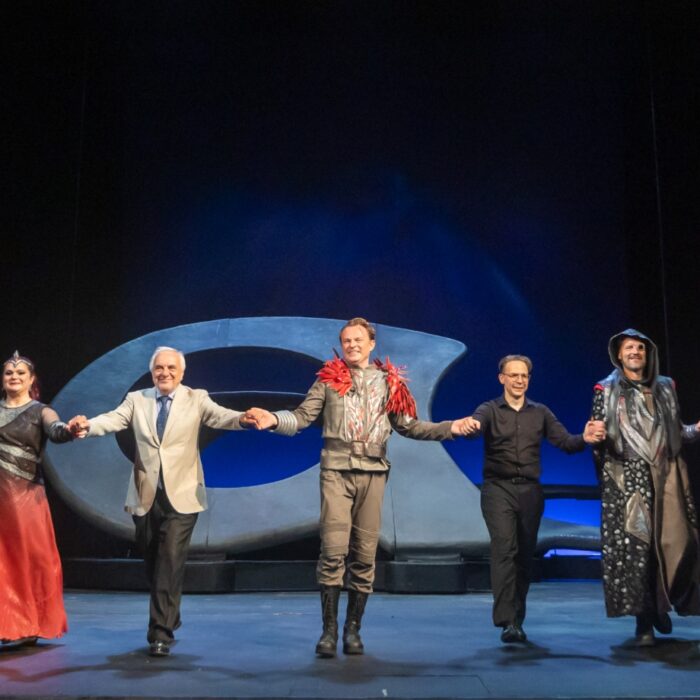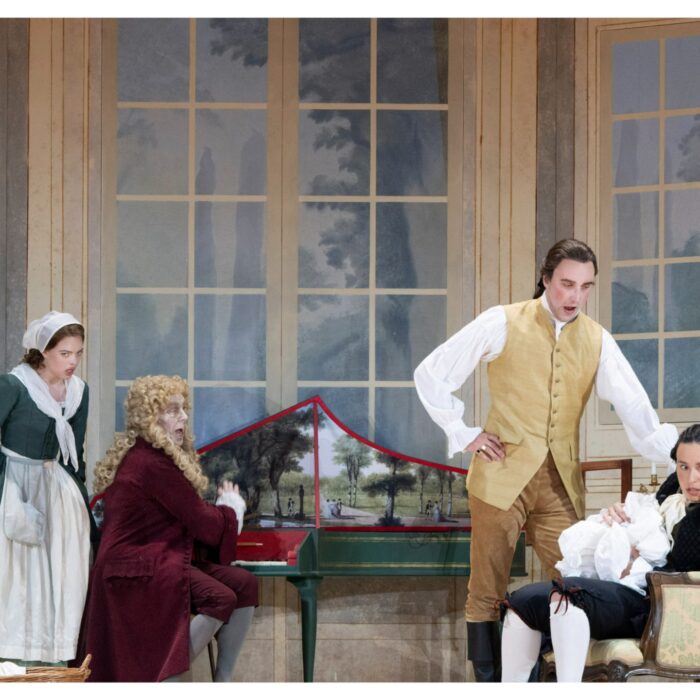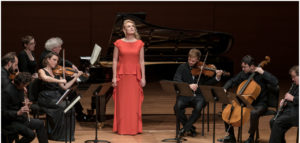
Lincoln Center Great Performers 2019-20 Review: Magdalena Kožená
Mezzo-Soprano & Artists Enchant with Exploration of Songs
By Logan Martell(Photo Credit: Kevin Yatarola)
On November 26, 2019, Lincoln Center’s Alice Tully Hall was host to the latest iteration of its Great Performers series. This installment saw Czech mezzo-soprano Magdalena Kožená joined by a number of distinguished artists, including Simon Rattle, violinists Giovanni Guzzo and Rahel Maria Rilling, violist Amihai Grosz, cellist David Adorjan, flutist Kaspar Zehnder and clarinetist Andrew Marriner.
The evening’s program was comprised of selections from artists such as Stravinksy, Strauss, Ravel, Chausson, Brahms, Dvorak and Janacek; a number of these cycles and songs were based around the writing of Shakespeare, with Stravinsky’s “Three Songs of William Shakespeare” setting to music a selection of his sonnets, while Strauss and Brahms explored the character of Ophelia with their cycles “Drei Lieder der Ophelia,” and “Ophelia-Lieder,” respectively.
Part I
First on the program was Chausson’s “Chanson perpetuelle,” making for a lovely and languid introduction to Kožená’s clear and lush mezzo-soprano, with the instrumental sections between the stanzas finely evoking a sense of creeping unease. The disconsolate nature of the text escalated as the narrator recalls the instances of her lover’s presence and embrace, with Kožená’s rising, sorrowful passion being underscored with deft trills. The departure of her lover hears lovely expression through the presence of the lone viola, with the rest of the string quartet joining back in once his absence is finalized; their tremolo built as Kožená released these feelings strongly, as if with a heavy exhalation that nicely conveyed her forsaken heart.
Making for a lighter change was Stravinsky’s “Three Songs from William Shakespeare, with the first, “Musick to heare,” featuring a relaxed, almost meandering intro from the flute and clarinet. This worked nicely with Kožená brighter, curious tones as the music stopped and started with a rather capricious feeling.
The second number, “Full fathom five,” adapts Ariel’s bewitching song from act 1 scene 2 of “The Tempest,” with Kožená sonorously glossing over the imagery of transformation through death.
The third number, “When Daisies Pied,” took things in a spritely, almost mocking direction as the sprawling, springtime text sets the stage for marital fears and infidelity, captured with Kožená’s repetitions of “Cuckoo!” which were nicely carried away by the swift flute conclusion.
Following in the Shakespearian theme was Richard Strauss’ “Drei Lieder der Ophelia.” The first song, “How shall I know my true love,” bearing a repeating, gently unhinged melodic theme from Rattle’s accompaniment, with Kožená’s outlining of the text matched by the delicately conflicted look on her face. Nicely capturing the sense of almost pitiable madness, the heightened chords of the accompaniment ease back into the melodic theme, tapering off to silence.
The second song, “Good morning, it’s St. Valentine’s Day,” started off with wildly excited, even jittery, passion as Kozena patter through the rather bawdy account of a young man being visited in the night by woman.
The third song, “They carried him naked on the bier,” bore alternating qualities from the preceding numbers, Kozena shifting from disconsolate lyrical beauty, to a brightly chirping middle stanza which slowly eased into a captivating mixture. The staccato of the third stanza gave way to firmer more lasting chords for Kozena to sadly exult, in such as “That is my prayer! God be with you!”
Next in the program was Ravel’s “Madagascan Songs,” with the first, “Nahandove,” featuring a highly sensual narrative in the text, with a warm cello introduction.
Kožená treated the text with an affectionate legato, bearing almost evocative repetitions as she calls the name of the titular lover. The approach of Nahandove saw a heavier, more lively shift as felt by the driving, lower rhythms of the accompaniment tinged with dissonance and contrasted with the chiming of the flute. These aspects slowed into a more profound final section, with Kožená’s voice softly emerging from the flute line with the phrase “your ecstasy dies, giving way to languor.”
The second song, “Aoua!” started with dire, forte chords which backed Kožená’s warning tones. The text follows an account of foreign invaders and the forceful change they bring to the native way of life. The grim energy of this number heard a more rustic influence with the flute’s rapid measures, joining Kozena in repeated cries of “Aoua!”
Third and last in this cycle is “It is sweet,” took a more relaxed route, with the solo flute leading the opening measures before the piano joined with soft, dissonant chords. This darker musical atmosphere, along with Kožená’s firm, languishing rendition, was brushed aside at the very end with her unaccompanied phrase “Go, prepare the meal,” making for a lighthearted close.
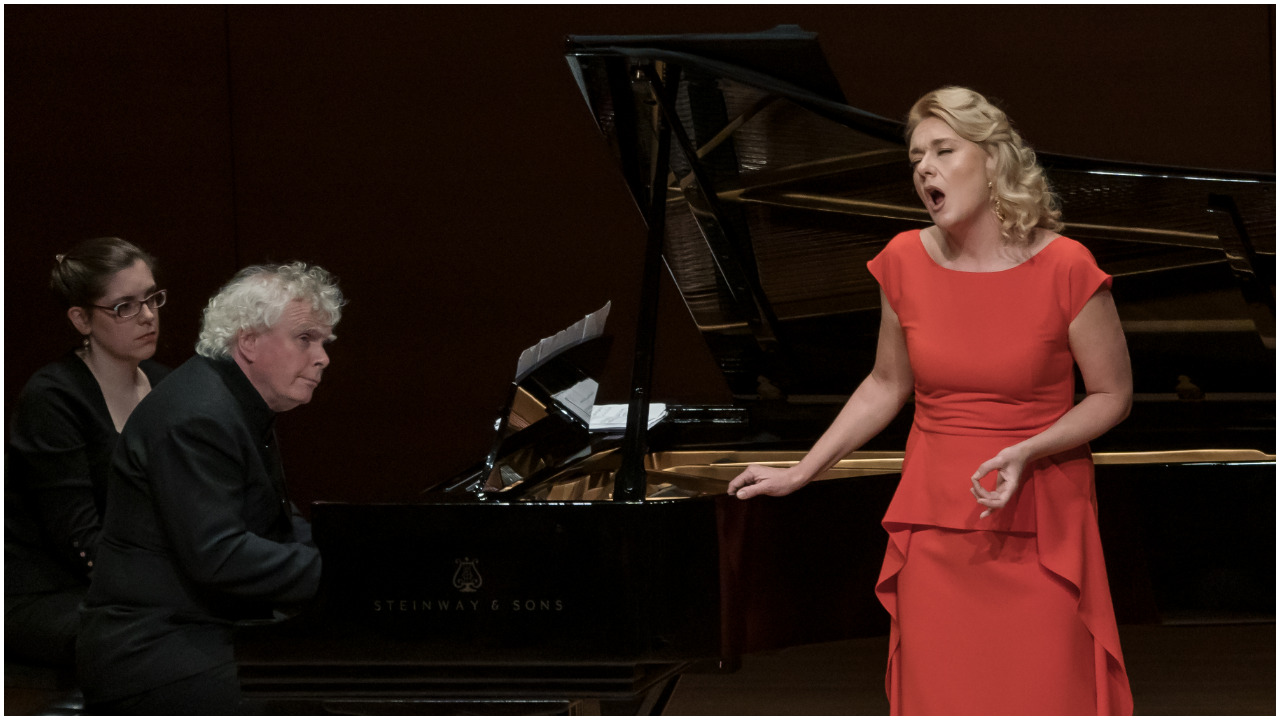
Part II
After the intermission, Kožená resumed the program with Brahms’ “Ophelia Lieder,” making for a strong and meaningful revisiting of Shakespeare’s tragic character through the five brief songs.
The first, titled “Wie erkenn ich dein Truelieb,” started with a heightened violin opening that bore a more poignant feeling than the light madness of the Strauss version. Kožená was likewise more sadly entranced, as heard by the attention she placed on the phrases describing her lover’s resting place.
The second song continues Shakespeare’s text in describing the shroud and flowers, with the mezzo-soprano using a more hopeful sentiment that settled nicely. The third song, revisiting St. Valentine’s Day, bore a brighter, folk-like charm that Kožená matched with a chipper sonority. The fourth song, “They bore him barefaced on the bier,” saw more lyrical phrases from the mezzo, beautifully contrasting the sing-song nature of the text, and continuing into the final song, “And will ‘a not come again?” Here, Kožená’s almost pleading phrases transitioned wonderfully into a softly grieving certainty as heard with her repetitions of “he is gone.”
Next from Brahms was “Two songs with viola,” with the first, “Stilled Longing,” featuring a warm, embracing introduction from the viola which Kožená joined with her mid-range outlining of the text, full of affectionate, questioning tones. The relishing viola conclusion drew applause before the song had finished.
The next one, “Sacred Lullaby” saw delicate, and motherly phrases from Kožená in entreating the heavens for a peaceful night of sleep for her child, her gentle cresting easing back towards a lovely hushed delivery.
Bringing the evening’s concert to a close were two song cycles from Czech composers Leos Janacek and Antonin Dvorak. First was selections from Janacek’s “Nursery Rhymes,” being a collection of very short but upbeat numbers which dispelled much of the heaviness of earlier numbers in fun ways such as in the fourth song “I’m giving a little talk,” where the group of instrumentalists who had been offstage quickly entered to provide the chorus before hurrying back through the doors.
Last on the program were Duncan Ward’s arrangement of six songs from Dvorak; these numbers saw Kožená relish in their sentiment as the instrumentalists drew out the ethnic flair of the works.
This night saw Kožená treat the audience to two encores, “Morgen, Op. 27 No. 4,” from Richard Strauss, and Dvorak’s “Good Night,” also arranged by Duncan Ward. These encores made for a splendid ending to the concert as the mezzo-soprano and artists drew an abundance of aural beauty.

